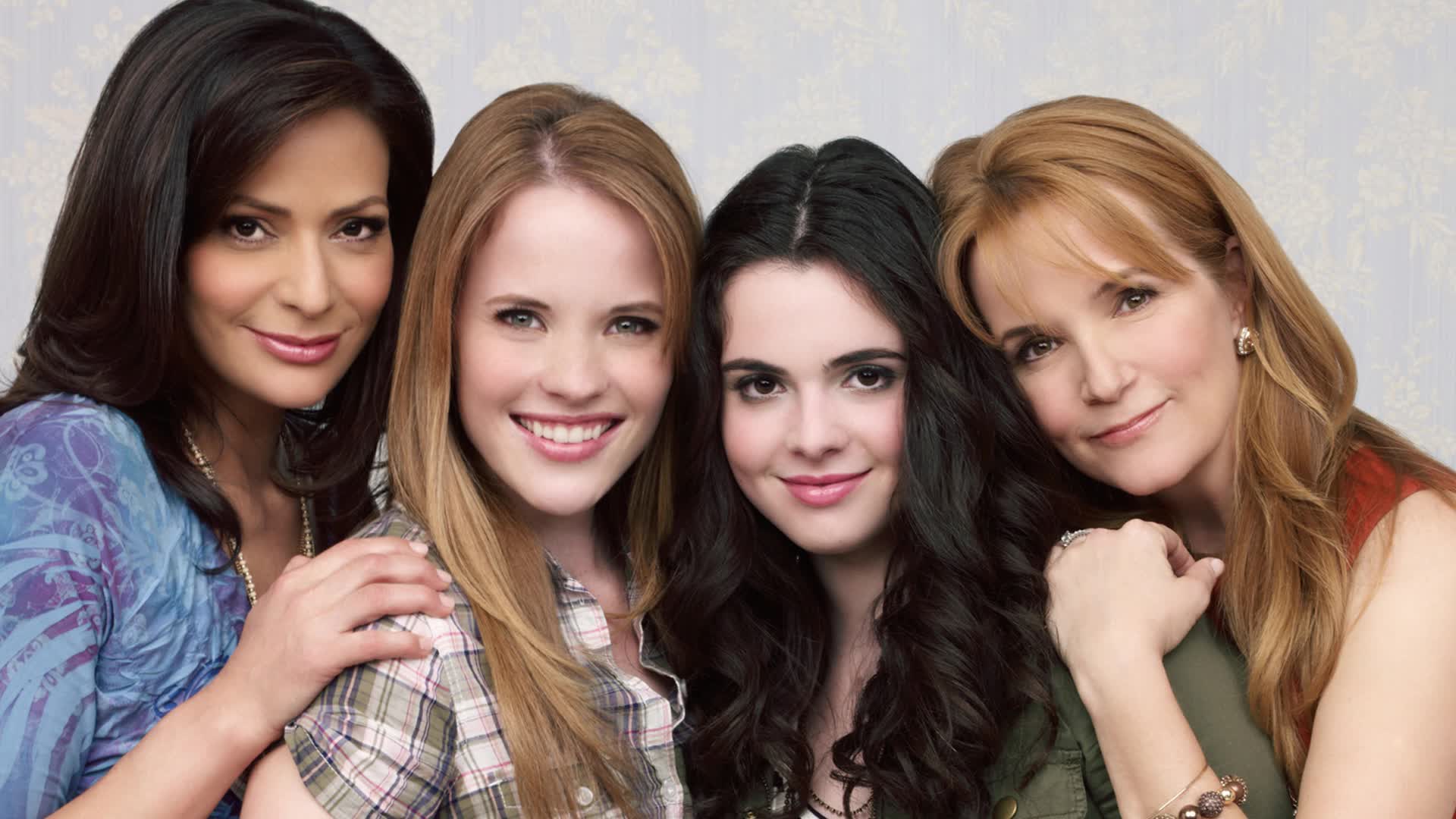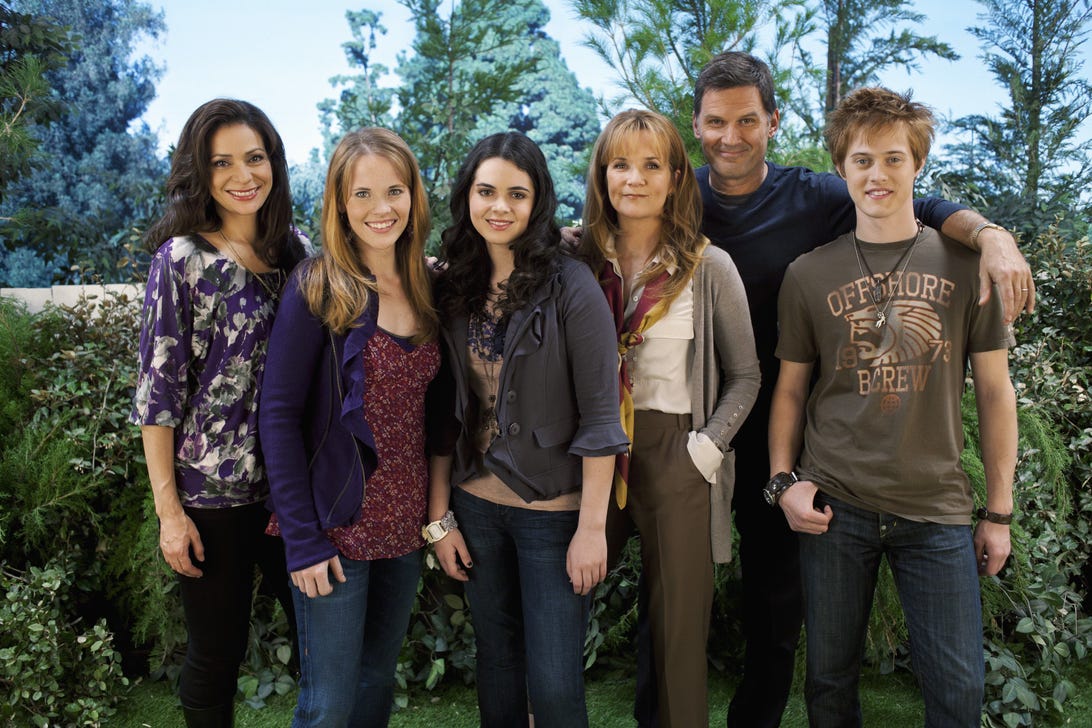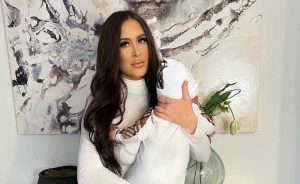
When Lizzy Weiss was pregnant with her second child, she listened to a podcast about two women in their 50s who found out that when they were born, they were sent home with the wrong family.
Weiss tells Metacritic, “I think it hit me hard and fast because I was pregnant and had a young child.” “I thought right away, “Oh no, what if they were teenagers when they found out?”When your identity is still in the works. Do I belong here? is a common question you ask yourself. Am I unique from everyone else?'”
This scary event became the basis for Weiss’ five-season drama series Switched at Birth, which is about two Kansas families whose teenage daughters find out that they were switched at birth, as the title suggests. The show follows Daphne Vasquez (Katie Leclerc), a basketball-loving teen who went deaf at age 3 after getting meningitis, and Bay Kennish (Vanessa Marano), a slightly rebellious teen with an artistic side. Bay lived in an upscale suburb with her father John (D.W. Moffet), mother Kathryn (Lea Thompson), who stayed at home, and older brother Toby. Daphne was being raised by a single mother, Regina (Constance Marie) (Lucas Grabeel). But if they hadn’t been switched, their lives would have been different, and in the series, there are questions about whether Daphne would have still lost her hearing if they hadn’t been switched.
Weiss only pitched the show to ABC Family, and they bought it right away. Brooke Bowman, who is in charge of original programming at ABC Family, thought the pitch was great, but she wanted the show to have one more thing that could go wrong.
Is there anything else that would actually bother, terrify, and enrage the affluent family that they were left out? Brooke questioned. Maybe they believe that if they had a girl, the money would have made a difference.” Weiss cites.
Weiss thought back to a college class she took called “Theater of the Deaf,” and she asked Bowman, “What if one of the girls is deaf?”
The Peabody Award-winning show, which got a 75 Metascore from critics, did a great job of balancing romances and drama for both the parents and the teens with a wide range of social issues, such as cyberbullying, alcoholism, and economic inequality, over the course of its five seasons. But what was even more important was that it focused on deaf characters (and actors) and told stories about how hard it is for deaf children born to hearing parents to be accepted, communicate, and learn. But it also showed that they were the same as other teens.
They “laugh, lie, cheat, steal, have sex, and do everything else hearing kids do,” according to Weiss.
Sean Berdy plays Emmett, Marlee Matlin, who won an Oscar, plays Melody, Ryan Lane plays Travis Barnes, Daniel Durant plays Matthew, Stephanie Nogueras plays Natalie, Anthony Natale plays Cameron, and Ashley Fiolek plays Robin. Nyle DiMarco, the first deaf winner of America’s Next Top Model, also makes a guest appearance on the show.
“I think we all knew from the start that what we were doing was different. Back then, it was new that there were subtitles and silent scenes “Leclerc tells Metacritic. “It was virtually entirely positive once we began receiving that type of response.”
Metacritic talks to Weiss, Leclerc, Marano, and Marie about making this groundbreaking series because it has been five years since the last episode.
Weiss knew that the only way to show what it’s like to be a deaf teenager was to talk to some.
Lizzy Weiss: I knew I had to learn more about deaf teens and talk to them. Marlton School is the name of one school in Los Angeles. With an interpreter, I attended a class of senior deaf high school students. The kids were so shocked when I explained what the show was about. There are two major characters, and one of them is deaf, they continued repeating.
After the pilot was approved, casting began. The first person chosen was Marie.
L.W.: Regina is the only character in the pilot who speaks ASL well, and we told the other actors, “We haven’t cast the rest of the show yet, but you need to start learning how to sign.”
Constance Marie: The character had to look like she’d been teaching her daughter sign language for 12 years. It was a very hard job. I know what it’s like to represent a group that doesn’t get much attention, and I wanted to do my best to play this role with the dignity and respect that the deaf community deserved.
Leclerc got the part of Daphne. She was already fluent in American Sign Language (ASL) and has Ménière’s disease, which causes her to lose her hearing sometimes.
L.W.: Daphne was essential to us in several ways. She needed to be hard of hearing and well-versed in sign language. She needed to be able to act as well. Once we got Katie, we stopped being anxious.
It was my first big series, says Katie Leclerc. I got to be a part of the screen tests for the other people in the cast. I really liked myself. And let me tell you, I almost fell over when Lucas Grabeel from High School Musical walked in. Lizzy said thereafter, “Whom do you think we should choose? Who made you feel comfortable?” That guy from High School Musical, I thought. It was a lot of fun even though I was such a fangirl and was so inexperienced and young.
Marano got the part of Bay. At the time, she might have been best known for her role as April on Gilmore Girls.
Vanessa Marano: The year before, I did a pilot for ABC Family that did very well but wasn’t picked up. The next year, there were five great pilots with great female leads, but none of them wanted me, not even Switched at Birth. They were much more interested in three other girls. No one of those girls worked out, and I don’t know why. So, I went in and took the test, and I got it. When you read the Switched at Birth pilot, you might have thought that Daphne would never be found. Bay turned out to be the role that was hardest to fill.
As soon as Leclerc and Marano were cast in a heavily promoted TV show, they became fast friends.
K.L.: I’ve loved Vanessa Marano ever since I saw her for the first time. We both had a lot of doubts about each other. We had both been the younger girl on set and had been underestimated or gotten into trouble with other cast members. Because of this, we were both sceptical about this new friendship. The first fitting we did took six hours and was for the wardrobe. They ordered Chinese food for us, and the person in charge of the wardrobe told Vanessa and me to wear trash bags over our clothes and wrap ourselves in saran wrap in case we spilled any Chinese food on them. I believe we’re going to be the greatest of friends, I remarked as I turned to face her.

V.M.: I met Katie for the first time at the test. She wasn’t there to read with us; she was there to stand next to us so they could see how we all looked. The second time I saw her, we were putting together a pilot’s wardrobe. I have a picture of us that looks like we are wrapped in cellophane. My mom is there because I had just turned 18 the day before, and it was a fun way for us to bond because it was so crazy. We got along from then on. I can’t think of a better co-star anywhere in the world. She remains one of my closest friends, and I adore her.
Except for Leclerc, who already knew ASL well, the rest of the cast had to learn ASL in a short amount of time, which was a tough task.
V.M.: I was lucky because, unlike Constance, who had to come in speaking the language perfectly, I could learn with Bay. It was a really cool thing to do, and since then, I’ve never had a job where I got to learn a new skill because of it. So that was something I really appreciated. It got better and easier, but they started writing more lines at that point. I worked with our ASL master every weekend for the six years that we did the show to learn my lines.
Leclerc worked on Daphne’s accent while the rest of the cast learned ASL.
K.L.: I made an audiogram of Daphne’s hearing loss based on what sounds she would be able to say and what sounds she wouldn’t be able to say. I knew the basics about how many different accents there are. It gave me a little bit of room to make that voice my own. I did a lot of work with my sister, who teaches ASL. I’m so happy about it. I’m not lying. I wish I could go back to that first season and show you my scripts. I used three different colours to mark the lines that were spoken, the lines that were only sign language, and the lines that were both spoken and signed at the same time. In my scripts, I had these tabs. I did all my homework. I did so much work.
The show was picked up for a full season, and when it first aired on June 6, 2011, it was the most watched show on ABC Family.
L.W.: Of course you’re always nervous. I loved it a lot. I knew it would work well. I was in a café when Kate Juergens, who was president of ABC Family at the time, called me and said, “We’re doing it!” It was a truly wonderful show.
K.L.: I worked at a strip club answering phones and just hoped and prayed. Obviously, it will change your life. I was at work when Lizzy called me on the phone, so I went to the kitchen and started jumping up and down. My parents got to visit Los Angeles, and while they were there, we went on a billboard tour. In one day, we completed something like 16 billboards. We just went from one sign to the next. They were all around. It was great.
V.M.: I don’t trust anyone. Since I was a little girl, I’ve been doing this, and I’ve seen a lot of pilots not get picked up. The table read was what made Switched at birth different. At the table read, there was a very different mood. When you saw how the network responded to the sign language, you could feel the room change. You could feel the energy in the room in a way that I never could.
While we were filming at this car wash in Agoura Hills, California, the pilot aired. I remember being soaked and thinking, “Oh my God, we did so well!” when we just got the numbers in. We were given 22 more episodes for the first season, which is crazy. I had a job for another year and a half, and I knew it. I’ve never had a guarantee like that before, and it changed my life because I bought a house.
In the third episode, Matlin joined the cast as Emmett’s mother. She would stay on the show for as long as it was on the air.
L.W.: Marlee started after we finished filming the pilot. She enquired as to whether she may take part. I first thought of Emmett as the adopted son of two deaf fathers, but that scene had to be cut, so I said, “Let’s change what happened before. Want to be his mother?”
C.M.: When Marlee Matlin was cast as Regina’s best friend, I thought, “Oh my God, I really need to get better at sign language.” She was really impressed by how hard everyone had worked on this show.
“Pandora’s Box,” the eighth episode of the first season, shows that Regina has known about the switch since the girls were 3 years old.
V.M.: That surprised me. Constance was the only one who knew, because it changed how she played things and what she said. What a great twist! I think it was one of the best ones we did.
C.M.: Lizzy told me when we were making the pilot. I was taken aback. I said, “Oh my God. She is such a bad parent.” She asked, “If you found out your daughter wasn’t yours, would you give her back right now?I like Lizzy’s writing because of this. She can write about both sides of an argument so well and with so much passion that it makes you really think. I swore not to tell anyone. I didn’t know who any of the other people were. I had to do what Regina did, which was to hide it with all my strength.
Unfortunately, it cost me a lot to learn ASL so quickly and so hard.
C.M.: Since I could do it, they kept writing more and more, which made my life less enjoyable. Most interpreters learn a language in two years, but I only had three weeks. So many of my fans had told me, “Thanks for proving that it is possible to learn sign language.” That’s why it was so terrible for me to get hurt. I wound up with nerve damage and tendonitis in both hands that will never go away. I felt like I had failed them. I just could not do it anymore.
In the second season of the show, the episode “Uprising,” which aired on March 4, 2013, was all done in American Sign Language.
L.W.: The writers and I decided that every scene had to have a character who was deaf. We chose to use music because our show used music to show how our characters felt and what was going on inside their heads. It was so scary, but everyone had so much fun with it that I said, “Let’s change things up every 10 episodes.”
K.L.: We knew we were taking a risk, and we’re glad that ABC Family gave us the chance to do so. The way our set was set up, each deaf actor had a sign language interpreter. So, if a scene had seven deaf actors, there were also seven interpreters, seven people who told the same information in slightly different ways. In that situation, I spoke up and said, “Everyone look at me. I’ll be the one who translates. I’m also an actor in this scene, and we both want the same thing. I’m going to talk to the director, and then I’ll tell you.” That was the only time that really happened, but it made for a great time.
V.M.: The episode was really Katie’s, Sean Berdy’s, and Daniel Durant’s. Ryan Lane’s episode. In that episode, all of the great deaf performers really got to shine. It was a lot of fun.
In the fourth season of the show, there was a story arc about consent. Now that Bay is in college, she gets drunk at a party and wakes up next to her ex-boyfriend Tank in bed (Max Adler). Bay can’t remember what happened, but she knows she never told Tank “yes” to having sex.
V.M.: Lizzy really walked a tightrope. She worked really hard to write it. When you think about the fact that “Me too” came after that episode, it’s interesting to see how in many ways that episode’s story was way ahead of its time. Campus assaults were causing a big reckoning, and even though many brave women came forward, they didn’t get what they deserved at the time. The grey weather made it an interesting episode to film. People had a lot to say about it while it was being made. We worked with some wonderful groups. The story was hard to get right.
L.W.: I have a daughter and a son. I really wanted to avoid making the boy look like a monster. There are stories about monsters with no wiggle room, but no one has ever asked, “What is consent?”
ABC Family changed its name to Freeform in January 2016. Switched at Birth was cancelled in March 2016, and it was said that the show would end after 103 episodes. “Long Live Love,” the last episode of the series, aired on April 11, 2017. In the last picture, Leclerc and Marano’s heads were put next to each other like they were in the show’s publicity photos from the first season.
L.W.: The last time we shot that scene, we did it at the Beverly Hills house we used for exteriors. On the last night, everyone went to the place where we shot the last scene. It was a very sad event. We all cried and gave hugs. I believe we all understood it was unique. The group was consistently quite joyful.
The tears were real, C.M. We were doing well because we were Freeform’s first show to reach 100 episodes, but we were still canceled. We were told that what we did was a big deal, but it wasn’t picked up. We all agreed that we would leave the show with the same heart and kindness we had when we came in. It was difficult to say goodbye to these people.
V.M.: The thing that sticks out most in my mind is how final it all was. How often do you get to work on a show that people like and that you enjoy making? That was something that everyone found very hard. We were all very, very hurt by it.
K.L.: On the last day, the props department played a joke on me. They set up something so that when I opened the door to my trailer, a bunch of ping-pong balls would come flying out at me. The last thing that happened on set was that. I have a lot of feelings, so I think everyone was like, “Will Katie be all right? We should do something silly so that we’re not crying when she leaves.”
But the show left a lasting impression. Weiss and Matlin are even working together again on Bonus Family, a multigenerational family drama about two families, one deaf and one hearing, that come together late in life.
L.W.: A whole generation of teenagers grew up watching deaf characters act just like hearing characters and see them as whole people.
K.L.: It was really great and special to be able to share that culture in a big way. My sister is an American Sign Language (ASL) teacher in the state of Utah. Switched at Birth is still taught as an example of something you can show your students in the ASL national curriculum. I think Switched at Birth lives on in a lot of ways and in a lot of people’s hearts. I still get recognized. Still, some people say that I learned sign language because of this show. I think that this little show could will have effects that last for a very long time.
V.M.: I thought Switched at Birth did a great job of turning the story on its head. Disability is not disability. It’s what makes you beautiful and interesting, and you should all feel lucky that you get to see the world as a deaf person. That was a big part of why the show was so good. So many untold stories were our cause.
C.M.: This show was just what the hearing and deaf communities needed to bring them together. For them to have a voice, for single mothers to have a voice, and for Latina single mothers to have a voice. On so many levels, it simply made sense. When Lizzy wrote, no one ever felt like she was pandering to them. There were all the things you need to make a beautiful cake.


